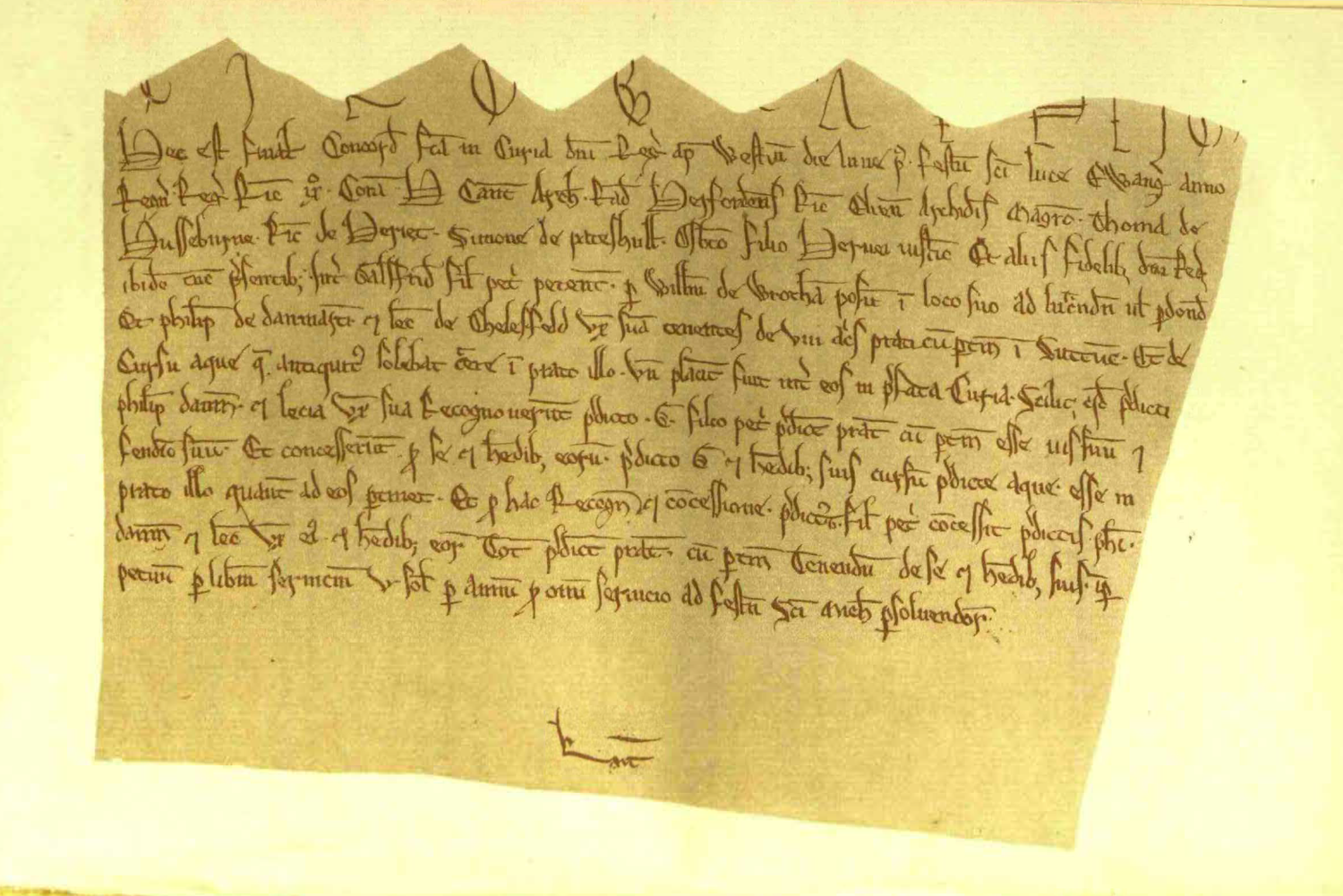
Pedes Finium
Contributions to the next volume are welcome. See the guidance for contributors and contact Editor Jason Mazzocchi. Also see the guidance for peer review.
Search page
Search within this page here, search the collection page or search the website.
Sir Roger Twysden's Journal
General Index
Pedes Finium
Page 224, after line 6, we ought to have added a few words as to the form in which we give the dipthong ce. In making our transcripts we adopted the single e as it appears in the originals, not being aware at the time of the "General Directions for the guidance of Editors," laid down by the Government in the publications issued under the authority of the Master of the Rolls, or we should, in this respect, have conformed ourselves to their regulations.
No. XII. - MERE is the manor of MERE COURT in RAIJilliM, Note to No. XIV. - Dugdale states that Walter de Bolebec left two daughters as his coheiresses: the one, Isabel, married to Robert de Vere, Earl of Oxford, who died 5 Hen. III.; the other (whose Christian name was unknown to him), wife of Elias de Bello Campo. This name, "Constance," our Fine supplies. There are other points of pedigree suggested in it.
The nature of the apportionments made by the Fine would imply that Ruellinus de Abrincis claimed through one of the sisters. The conjecture that he might have been the husband of Isabel (before her marriage with the Earl of Oxford) is invalidated by the fact that she is not made a party to the Fine, which, in that case she would have been; and her buildings are mentioned in it as distinct from the portion of Ruellinus.
On the Pipe Roll, 2 Ric. I. there is this entry: - "Comes Albricus reddit computum de D marois pro habenda- filia Walteri de Bolebeok ad opus filii sui;" and on Pipe Roll, 9 John, we have: - "Robertus de Ver oc marcas et iij pnlefHdos pro habenda in uxorem Y de Bolebec; si ipsa voluerit, ita quod si eam duxerit in uxorem ipse reddet finem quern ipsa Y fecit ne distringatur ad se maritandnm per placitum comitis Albrici," There was, therefore, no previous marriage to that with the Earl of Oxford.
By Inquisition on death of this Robert, Earl of Oxford, taken at FLETE in Kent, Friday after Michaelmas, 24, Edw. I., it is returned that he held the manor of Flete, next Sandwich, of John son of John de Sandwich, by service of one knight's-fee, and that there is a capital messuage, with the curtilage, dove-cote, and certain closes worth 6s. 8d. per annum; Item, rents of assize at Michaelmas xxiiijs. viijd.; Item, at the feast of St. Martin, lxxivs. vijd.; Item, at the feast of the Purification, xxiijs. iiijd.; Item, Rents at the Nativity of our Lord, xxvii. cooks worth 1.5d. each, and xliij hens worth 2d. each; Item, that there are there 80 acres of arable land, worth 2s. per acre per annum, and 315 acres of marsh land, worth 1s. per annum; Item, that Robert de Vere, son of said Robert, is his next heir, and is 24 years of age.
Sum total of the Extent, xxxli. xiiijs. vjd.
The subject of our Fine is an apportionment of half a knight's-fee in Flete, between Isabel's sister and Ruellinus de Abrinois; while, in this Inquisition, it appears that Isabel's son, Robert de Vere, had inherited an entire knight's-fee there. It would seem, therefore, as if the two coheiresses had inherited a knight's-fee between them,-half a fee each;-that Ruellinus had a claim (whether as son by a former marriage, or by what other means, does not appear) on the sister Constance's share, which it was necessary to settle by "FINAL CONCORD," and that Robert de Vere had eventually become heir to the entirety. The ten marks paid by Ruellinus were probably merely for "equality of exchange."
We have felt bound, as honest commentators, to give all the facts as we find them, and to offer the suggestions which occur to us, but in no wise do we presume to dictate categorically to others. We offer merely our own passing conjectures, courting at the same time the information of those who may be able to correct us.
No. XXXV. - To "Malete," in the note, should have been added: "the final e of this word in the original, is in the form of a contraction for erre."
Note to p. 271 - Among the public Records, there is a book of Knights'-fees in Kent, transcribed anno 35 Hen. VIII., from one prepared anno 20 Edw. III. for raising an Aid to make the Black Prince a knight. In this book there are the following entries: -
IN THE HUNDRED OF SHAMEL.
Manerium de GODYNGTON in STRODE.
De Simone Godyenton pro dimidio feodo quod Alanus de Godyenton tenuit in Strode de predicto Galfrido ["Stodeland," the transcriber's error for "Scolland," the "Escollant" of our Fine] et ipse de dicto Comite [Leicestre].
De eodem Simone pro dimidio feodo quod Alanus de Godyenton tenet in Strode de prefato Galfrido, et ipse de Comite Leicestre.
IN THE HUNDRED OF RUXLEY.
Manerium de OXELLESFELD.
De Ottone de Grandisono pro uno feodo et sexta parte unius feodi que idem Otto tenuit in Chellesfeld et CALDEOOTE, de Simone de Monte Forti et ipse de honore de Newbery.
Manerium de GODYNGTON.
De Willelmo de Godyenton, pro uno feodo quod Simon de Godyonton tenuit in OXELLESFELD de Henrico Stodeland [Scolland] et ipse de Simone de Monte Forti.
Manerium de FARNBOROUGH.
De Heredibus Johannis Flemyng, pro uno feodo quod predicti heredes tenent [? tenuerunt] in FERNEBERGH et CHELLESFELD de Simone de Chellesfeld; et ipse de Simone de Monte Forti.
No. XLII. - Add to the note: "or Street (in Domesday 'Estraites'), a manor in Limne, afterwards called Court at Street and Courtup Street, the chapel of which was celebrated for being the scene of the impostures of the 'Holy Maid of Kent.'"
